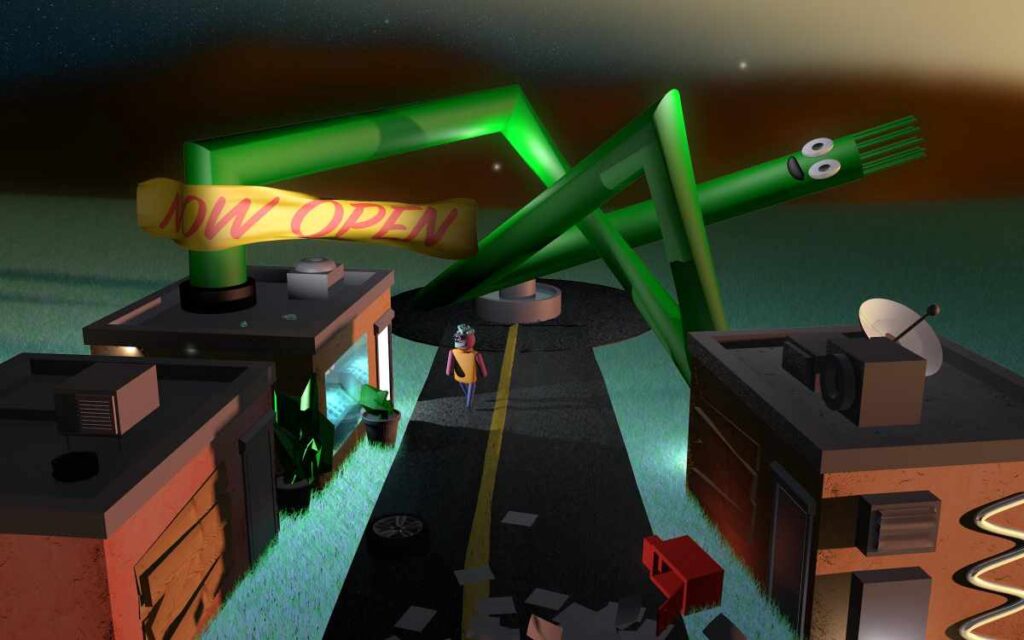Examining the myth of the crisis-born startup
On May 6, I got a message from my cousin Stacey, who had just returned from a yearlong maternity leave to the global consulting firm where she’d been working for the past decade. “Well, I will be joining the entrepreneurial ranks shortly,” she wrote. “Got laid off today.”
It sucked. Stacey has a one-year-old daughter, a house that isn’t much older, a big mortgage and expenses, and all the stress that comes with unemployment. But this was also something Stacey had been expecting for a few weeks — and secretly hoping for. She had been kicking around a business idea for a while that was close to her heart — an automated device to disinfect wheelchairs in long-term care homes, like the one where her father (my uncle) resides. Like everyone else in our family, Stacey has a strong independent streak, which ultimately called her to entrepreneurship. (Until recently, she was my only relative with a regular job.) “This is just the kick in the ass I need to get started,” she told me.
Considering how awful it is to be a human now, it seems like an even worse time to become an entrepreneur. Unemployment is soaring. Bankruptcies, too. There aren’t nearly enough PPP loans to make the bleeding stop for small businesses. Businesses everywhere are struggling for survival, barely scraping by on a fraction of their revenues as we plunge even further into the most severe global economic contraction in, well, recorded history. Amid all this, going out on your own seems like a lemming’s leap. There’s nothing to catch you out there, and the rocks below the cliff are extra sharp.
But none of that deterred the entrepreneurs I have recently heard from, whether this is their first plunge into self-employment or just the latest in a series of businesses. Since the pandemic lockdown began, I have seen dozens of new businesses launch, from takeout restaurants and wine delivery services to online camps for kids and virtual tutoring to interior design firms and gardening companies.
The list grows every day. Axios recently reported that accelerator Y Combinator saw an increase of 15% to 20% more applicants for its summer program. Some of the entrepreneurs I spoke with come from money and have prestigious business degrees. Others are working with whatever resources they can scrape together. All of them seem to think that right now is a perfectly reasonable time to start a business.
Related Post: How an Economic Downturn Creates Huge New Opportunities
Considering how awful it is to be a human now, it seems like an even worse time to become an entrepreneur.
Are they foolish? Not necessarily. Entrepreneurs, VCs, and business journalists like to point out that many hugely successful businesses were founded in downturns, from GE, Disney, and FedEx to Slack and Airbnb. This 2009 report by the Ewing Marion Kauffman Foundation, a nonprofit research and advocacy group for American entrepreneurship, found that approximately half the companies on the Fortune 500 and Inc. 500 lists were founded during recessions or bear markets. In fact, two of the most active years for starting businesses in the United States recently were during the peak of the Great Recession (an adorable name, in retrospect).
I was living in New York when that recession hit and spent some time interviewing a group of these new entrepreneurs. Most were young, intelligent, experienced, and highly educated; all had been laid off from their jobs in finance, media, consumer goods, real estate, and engineering and went into business for themselves. They opened yoga studios, financed solar panel installations, designed toys and baby clothes, and created organic vegan soups. Most of these businesses are still around.
My favorite was Four & Twenty Blackbirds, a pie shop started by sisters Emily and Melissa Elsen in 2009 out of their apartment in Brooklyn. Melissa had moved to the city and couldn’t find a job in finance, and Emily had survived a couple rounds of layoffs at a photo agency and left before getting fired. The Elsen sisters turned to the thing they knew best: pie. Since the 1980s, their mother and aunts had operated a restaurant in the small farm town of Hecla, South Dakota, that was famous for its pies, so the sisters applied their family’s scratchy spirit of thrift to dough and fillings. They delivered their pies by bike until they opened their first store, in the shadow of an elevated expressway.
“Pie is a recession food,” Emily told me back then. “It’s a basic, practical way of making dessert without being too fussy.” In fact, their menu included a Recession Pie, a vinegar-based pastry with a lot of sugar in it that tastes like a tangy custard and is very inexpensive to make. “We’re expecting the worst,” Emily told me. “We’ll be lucky if we get five people for coffee. But that’s a challenge that we like.”
The worst didn’t come—far from it. Four & Twenty Blackbirds quickly became a success, garnering press, selling out of pies daily, and eventually expanding to two retail locations, a commercial commissary that supplied wholesale accounts, national pie shipping, and even a cookbook. (It helps that their pies achieve a level of deliciousness that cannot be captured in words.)
Amid all this, going out on your own seems like a lemming’s leap. There’s nothing to catch you out there, and the rocks below the cliff are extra sharp.
When the pandemic shutdown began, the Elsen sisters immediately adapted the business, closing the cafés and focusing on delivery and staff safety. They have had to close only one day since then, while the pies keep bringing a little slice of joy to New Yorkers stuck at home.
“I remember 10 years ago, people said, ‘You’re opening during a recession?’” Emily recently told me. “And now it’s ‘How do you safely operate during a pandemic?’” She thinks becoming an entrepreneur in hard times helped her build a stronger, leaner, more resilient business. “Maybe it’s our upbringing in a rural farming community,” she says, “but [we have] a sense of resourcefulness and the idea that failure is not an option, a can-do attitude, and, of course, ultimately a responsibility to the survival of our business,” all things the Elsen sisters credit with their ability to survive this and whatever else comes their way.
Of course, what we are going through now is vastly more dire in terms of the economic costs and uncertainty facing entrepreneurs than any prior downturn. There is no end in sight, no sense of the bottom, and that can be paralyzing. But entrepreneurship is never certain. The economy could be firing on all cylinders, business could be “as usual,” but fundamentally, so much is out of the entrepreneur’s control. Risk is simply something they must accept. The rent could be raised, the owners could get sick, an accident could happen, or a market could shift in ways you couldn’t expect and cannot adapt to.
The entrepreneurs venturing out into today’s black hole don’t seem to be ignoring those risks. They are acknowledging them and embracing the uncertainty inherent in the world, because they still see something promising.
Related Post: Six Ways to Make Money in a Bad Economy
Brian Elliot and his fiancé, Gabe Kveton, who live in St. Louis, are both seasoned entrepreneurs, with experience in technology, consulting, real estate, and food industries. Last year, when they began dating, they both became fascinated with an obscure subject called the asset recovery industry, where ordinary citizens can reclaim assets they are entitled to that the government controls. “Some reports have shown that the government is holding over $50 billion in funds that belong to private citizens, and most people don’t know that those funds exist.” Elliot says. “And if they don’t claim them in a certain period of time, they lose access to those funds forever.”
The couple’s interest in asset recovery was just that: something they spoke about while Elliot pursued his other ventures and Kveton worked as the director of catering at the St. Louis Art Museum. But when Kveton was furloughed from his job in March, suddenly the opportunity was urgent. “The minute that happened, we were actually kind of excited, because it meant that we had some time to focus on actually turning Gateway Asset Recovery from an idea into a real business,” Elliot says. So far, they have helped several clients process claims and retrieve thousands of dollars, and they are about to hire an intern.
The truth is there’s never a good time to start a business, just as there is never a bad time to start a business.
Even though there are downsides to starting a business now — a lack of investment capital, shifting regulations, decreased consumer spending — for Elliot and Kveton, the advantages of entrepreneurship still outweigh the risks. Talent is available, the barriers to entry are low, and time is available (especially if there are no children around).
The current environment also presents new opportunities. Even in my circle of friends, a few are launching businesses to capitalize on shifting trends. My friend Josh Charbonneau, a cook and restaurant manager who recently lost his job at a barbecue place outside Toronto, is starting a prepared seafood distribution business called Joshie’s Good Eats, because, as he puts it, “People will always need food.” The business is designed to be as lean as possible: no location to rent, no staff, as little overhead as possible, and all funding from family loans. Charbonneau says the business is “too small to fail.” His mother, a graphic designer, is making him a logo. Another friend, Leigh Lampert, who worked as a lawyer for traditional firms, the government, and as an in-house corporate counsel, realized at the very onset of the crisis that now was the perfect time to launch a new law practice targeted at clients looking for flexible and affordable alternatives as their budgets shrink.
One of my favorite reasons I heard for launching a business right now came from Robert, a fellow freelance journalist (who asked to remain anonymous while he’s still at a job). He is about to launch a travel business suited to the post-Covid era (domestic only, wellness-related, affordable) and finds this time incredibly exciting. “I kind of like the fact that no one is starting a travel business right now,” he says, “so competition will be less.”
The truth is there’s never a good time to start a business, just as there is never a bad time to start a business. Every economy holds opportunities for success — and just as many chances for failure. For entrepreneurs who decide to make the leap out on their own (only about one in 10 of us, up until recently), the only time that matters is the one they chose.
Entrepreneurship is fundamentally an act of faith: a belief in your ideas and your ability to make a go of them. At the end of the day, that’s all you’ve got.
David Sax is an award-winning journalist, keynote speaker, and author. He has written for “The New York Times”, “The New Yorker” and “Bloomberg Businessweek”. David is the author of “The Soul of an Entrepreneur”, “The Revenge of Analog”, “The Tastemakers”, and “Save the Deli”. To learn more about David go to saxdavid.com












